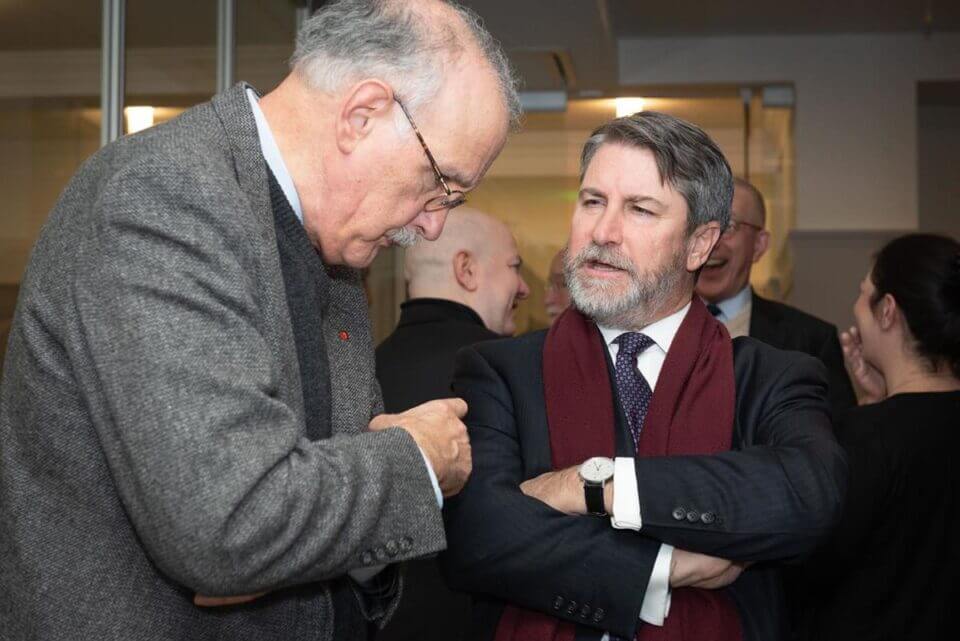
“Or is man—like some argue of Odysseus—a restless seeker of new places, people, and experiences?”
The last few years have seen laments and eulogies for liberalism as a political system and ideology, from across the political spectrum. The one thinker and writer who encapsulated this new mood did not come to mourn liberalism but to bury it. With the publication of Why Liberalism Failed in 2018, Patrick Deneen provided the key text in political philosophy for the demise of liberalism: why it died, and why it is not coming back. The appeal of his diagnosis crossed partisan lines, with even former President Barack Obama endorsing Deneen’s work. This book represents a strain of conservatism skeptical of Enlightenment rationalism, which emphasizes individual freedom and autonomy, disregards particularity and contingency, while still freighting liberty with appropriate weight. Deneen’s thought is crucial to our current moment, and this introduction seeks to frame him in our current political and philosophical context.
Background
Patrick Deneen was born in 1964 and was educated at Rutgers University, earning a B.A. in English literature in 1986 and a Ph.D. in political science in 1995. From 1997 to 2005, he was an assistant professor at Princeton University. He was then appointed to the faculty at Georgetown University in 2005 and was the Markos and Eleni Tsakopoulos-Kounalakis Chair in Hellenic Studies until 2012. He is now Professor of Political Science, holding the David A. Potenziani Memorial College Chair in Constitutional Studies, at the University of Notre Dame. As we can see, his career up to now has been highly accomplished. This is reflected in his work—both academic and popular—in books and various periodicals.
Deneen has published four books, beginning with The Odyssey of Political Theory in 2000, based on his prizewinning dissertation of the same name. Having recently read this work, it is safe to say that this prize was more than well-deserved. His book Democratic Faith was published in 2005, Conserving America? Thoughts on Present Discontents in 2016, and his best-known book, Why Liberalism Failed, in 2018. Alongside these, Deneen has also published in a wide variety of conservative publications. These include First Things, The American Conservative, The New Atlantis and Front Porch Republic (FPR). Deneen helped set FPR up in 2009, with the essay “A Republic of Front Porches.” FPR’s ethos strikes a localist tone, echoing the writing of famed agrarian Wendell Berry. It has been labeled as paleoconservative. Now, however, it would more aptly be seen as part of the nascent post-liberal movement, arguing against ideology and bigness and arguing, instead, for the small, local, and relational. In short, this is a conservatism of limits. This ethos pervades Deneen’s work overall and will be explored further here.
Deneen’s Conservatism of Limits
What leads one to find the good life in our time on this earth is the central preoccupation of philosophy. Deneen’s worldview, from the time I have spent in its fold, descends from a long line of Aristotelean natural law philosophy, mediated by Tocqueville, German-American political-philosopher Leo Strauss, historian and social critic Christopher Lasch, and the work of post-modern conservative Peter Augustine Lawler. These are all thinkers who try to find the best way to live in the condition of modernity in which we find ourselves thrown from birth.
Deneen has become famous (or infamous) for his critique of liberalism as the hegemonic political dispensation of the Western world, particularly in the Anglosphere. We can see some of these critiques taking shape in Deneen’s first book, The Odyssey of Political Theory: The Politics of Departure and Return. The fundamental question of this prizewinning work is that of origins. Where do we come from, and what does this tell us about our direction in life’s journey? Deneen then proceeds to answer this question over a couple of hundred pages through the lens of Homer’s Odyssey, in particular through the moral actions and development, as Deneen sees it, of Odysseus himself, the wanderer sitting on the shores of Calypso’s Ogygia, the tears of longing running down his cheeks.
The question of origins and the endpoint that follows—what the Greeks called telos—is vitally important. Are we made as limited creatures, who can best pursue the good life in accordance with our nature as part of a community, a polis? Does this, then, mean universality of spirit is impossible and should not be sought? Or is man—like some argue of Odysseus—a restless seeker of new places, people, and experiences? Is man, as Peter Augustine Lawler used to say, both a wanderer and wonderer? What are the limits, if any, to these desires to know and see more?
…the most important question is: What, and whom, do we love?
As Deneen lays out in opposition to his own position, those like Martha Nussbaum (and others in the cosmopolitan vein of political philosophy) make much of the arbitrariness of limits imposed upon us since birth, externally and without our consent. What need have we of limits to the riches the world has to offer, the delights that stir the soul to reach for more, for ever greater heights of experience and depths of knowledge and understanding? Deneen answers that the limits of life are, in fact, those things that give shape and texture to our existence, which define the different spheres of life and, ultimately, enable us to go out and meet that which is different to us. It is also what allows us to encounter it in a spirit of openness that can be curiously absent from the supposedly open cosmopolitan.
Ultimately, through the tales of Odysseus’s trials and torments that pursue him to the ends of the earth over the wine-dark sea, the most important question is: What, and whom, do we love? Love is not infinite and cannot be an everlasting resource. This does not mean hoarding it away like in a miserly way, resentful at the impositions the world makes on you. But nor does it mean frittering it away to the four winds, only to find nothing left for those closest to you in heart, even if not in time or place.
This is the central question Odysseus and—through him—we, the audience, must grapple with. The answer may seem at first ambiguous, as Odysseus first dallies with Circe for a year, then spends seven long years with Calypso, giving his love to her. There is ambiguity about whether Odysseus will even stay in stony Ithaka when he finally arrives home, with Tiresias foretelling that after some time, Odysseus will grow restless and set out again on the wind-driven road of the sea, until he lands and journeys to a place where they have no knowledge of the sea and mistake his oar for a farming tool. This ambiguity follows Odysseus through the play, leaving the audience questioning his commitment to Penelope and Telemachus, and to his polis on Ithaka.
However, as Deneen argues, all of these questions may be answered by the fact that Odysseus makes the choice to return home. He makes the choice—with some help from his crew—to leave Circe. He makes the choice, the ultimate and life-defining choice, to refuse Calypso’s offer of the immortal, eternal youth of the gods. Instead, he sets sail for home. This choice between eternal life and eternal death is made even after seeing what fate awaits Odysseus in grey Hades, where so many like Achilles and other heroes of Troy spend shadowy eternity, forever longing for the brightness of a new dawn that they will never rise to meet again. Even despite this, Odysseus accedes to the final, ultimate limit on life, one which defines how we must live ours, in light of the knowledge of the straitened circumstances of our finite existence.
The offer of the cosmopolitans is one of infinitude, of seeing behind the nature of things to the reality out of sight of mere mortals in the Odyssey. Hermes giving Odysseus the ability to find the flower to resist Circe’s charms is the same as those who would strip away the comforting abut limiting illusion of family, community, locality, and country. These are, ultimately, those things which make life worth living and which give meaning to the gift of life we are ultimately only too fortunate to have and which we all know—try as hard as we might to deny it—that we only have a little time to savor.
While Christians may not have the grim knowledge of a grey, listless forever spent in the halls of Hades, the passing from this life to the next still strikes at the core of our being. It is the one reality we all share, no matter our station in life or the material and status prosperity we happen to enjoy. The equality in life that comes from death is already on view in embryonic form, according to Deneen, and it is one that having developed into the all-encompassing worldview it did, we should not throw away lightly, lest we find ourselves back in the blood drenched, glory-seeking madness of the Illiad.
As thinkers like Glaes Ryn have also argued, the particularities of our lives give shape and meaning to the universal experiences we all share. It is only through the meditating of our particular time, place, and tradition that we can begin to apprehend the universality of human existence. The universality unmediated and revealed by particularity that is offered to us by the cosmopolitans is a dry, formless, and purposeless existence, cut off as it is from the good of our communities which, in turn, forms and enables the pursuit of the good of our own lives.
Sitting above the relational affairs of men may seem enlightened; it is also lonely.
Without a family and community to form us, we encounter the world from a distance, unable to engage with it for want of moral and intellectual formation. Transcendence is for the gods, Odysseus, according to Plato, seems to say. Transcendence out of the cave of our lives seems glorious, but there is more than glory on offer for those who see what there is outside of the cave and then seek to return to what provides the value to their lives. Sitting above the relational affairs of men may seem enlightened; it is also lonely.
Maybe, as Deneen argues from Odysseus’s side, the lesson of life is that in order to find the home we all seek for our restless hearts, the place to start is from a sense of home in our time here, instead of ceaselessly searching for a place of rest that never comes and draws further into the distance as we move endlessly over the face of the earth. Until our hearts rest in God, as Augustine put it, we will never know final rest. But as Lawler wrote, while we are never truly at home in this world, we must nevertheless make a home in it.
The moral ambiguity and complexity of Odysseus mirrors that in our own souls. Our hearts, imprinted with the legacy of man’s fall, bear the mark of good and evil, riven by a line that we must all contend with. As well, we, too, share with Odysseus both the longing for home and for the journey itself, for the return and the leaving. However, as Deneen demonstrates, Odysseus, as a choice maker, mirrors our ability and obligation to choose—aided by our rationality and will—the course that best enables us to pursue the good life, individually and in common with others. It is also up to us to make the choice Odysseus made, to accept the reality of our mortality, and to make a home with others the best we can in the time we have.
The conflicting longing for adventure and homecoming symbolized by Odysseus is a conflict that defines the human condition. For Deneen, the lesson we should draw from life as pointed by the Odyssey is that making the choice towards an acceptance of limits (and a reconciliation with our own existential finitude) is key to experiencing the joys amid the sorrows of life. The particularity of community, time, and place shapes our ability to participate in the universal joys revealed in the particularities of the common life. Without this, we are left lost, sundered from the ties that bind us into a web of relationships and meaning that bring gladness along with life’s tragedy. Without this, we are left homeless body and soul, with no rest either in this world or the next.
The making of this home—within the limits of life that Lasch was so eloquent at delineating and defending—has been under threat from the solvent of liberalism since it was born from the pens of Hobbes and Locke. This philosophical acid, dissolving our search for home into a directionless spinning-top of a quest, has laid waste to our ability to find any sense of rest. Deneen’s direct attack on liberalism must, therefore, be seen in this light, and is where we turn next.
Henry George is a freelance writer from the U.K., focusing on politics, political philosophy, and culture. He has also written at Quillette, Arc Digital, Reaction, The University Bookman, and Intercollegiate Review.











good essay – the modern world, both left and right, is based on the superstition that something can be got for nothing